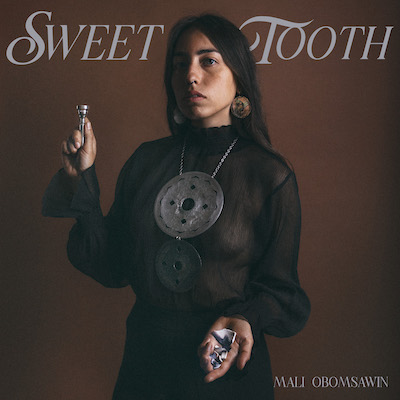
As well as being a clarion call and a beacon of defiance, Mali Obomsawin’s ‘Sweet Tooth’ is one of those albums that utterly defy expectation or convention – it occupies its own universe, arriving from leftfield to blow your mind.
By coincidence, I first encountered the talents of Mali Obomsawin a few days after buying Bush Lady, a deeply affecting masterpiece and the sole recording by Alanis Obomsawin, a legendary Abenaki American-Canadian documentary filmmaker, activist, singer, and an elder in Mali’s family. Bush Lady had thankfully been rescued from obscurity by Montréal’s Constellation label and released on June 15th, 2018 – the week prior to my annual pilgrimage to Mayne Island, BC, for the Campbell Bay Music Festival. Appearing at the gathering that year was the folk trio Lula Wiles, whose latest album, Shame and Sedition, was issued by Smithsonian Folkways Recordings in May 2021. With the band now on indefinite hiatus the three members are currently pursuing other projects: Eleanor Buckland released her solo bow last October; Isa Burke is playing in Aoife O’Donovan’s backing band, and their double bassist, Mali Obomsawin, has unveiled Sweet Tooth.
Bush Lady, being a conveniently classic example, I love discovering albums that, for any given reason(s), utterly defy expectations or convention as recordings that occupy their own universe, arriving from leftfield to blow your mind. Think of releases such as Talk Talk’s Spirit of Eden (especially in the wake of the hit singles and largely commercial synth-pop that had preceded it), or a project like Floating Points’ magnificent collaboration with the late Pharaoh Sanders and the London Symphony Orchestra.
Sweet Tooth is one of those albums.

I feel it’s reasonable to assume that most who enjoy Lula Wiles’ music would expect a Mali solo project to dwell in the same roots-based territory, but – no. Instead, this incredible album is a radical departure, unequivocally emanating directly from Mali’s cultural identity, and their wider, deeper world of sonic creativity, exploration, and study, the artistic aspect of which I confess to having being ignorant of until now.
So, to this listener and anyone else fortunate to experience it, the remarkable 37 minutes of Sweet Tooth arrive as a revelation – even more so when learning it was all recorded in just two days. However, before examining the music, it’s absolutely vital to outline elements of the motivation behind this release from cultural and historical perspectives. Yet, in doing so there is little point in my making a clumsy attempt at paraphrasing or reframing an already eloquently expressed explanation from the artist and their press representation, as they authoritatively offer greater clarity than I could summon.
It is also acutely pertinent to do so at this moment in history, as Britain enters the second so-called Carolean Age. The accession of King Charles III brings with it an opportunity that should not be missed for the Crown to make formal apologies, and offer substantial reparations to all Indigenous peoples, everywhere, that have been affected by the brutalities of historical British imperialism. No apology was forthcoming in the seven decades of Queen Elizabeth II’s reign, so my personal confidence that it will happen is low, but the new king should contrive to visibly usher in an era of meaningful reconciliation and healing. While some may believe that the damage was done by our forebears centuries or decades ago – so has little bearing on today – the enduring generational trauma is very real: I have despairingly seen its chronic effects on my travels elsewhere in the world, but witness it on a regular basis among the Indigenous community of my hometown of Nanaimo on Vancouver Island. The attitude that ‘it all happened long before I was even born, so what’s it got to do with me’ is frighteningly prevalent, particularly and predictably among the ex-pat Blue Rinse Brigade, but I’ve been shocked to encounter it not only often, but among plenty of people under 40. You may be reading this after the fact, but among the City Councillor candidates at our municipal election on October 15th is a young man who, in the ‘Relationships with First Nations People’ section of his platform, has this to say:
“The people living in Nanaimo today had nothing to do with Colonialism, or the Residential Schools, or the Flawed Treaty System… I believe it is essential to learn History, to learn from History, and strive to avoid the mistakes that were made historically, but I do not believe that Modern people should accept guilt or responsibility for actions that were done by their ancestors,” yet later contradicts himself when stating, “What happened to First Nations peoples was wrong, but we move forward, not dwelling on the past.”
He won’t be receiving my vote.
On September 29th – the day prior to Canada’s 2nd annual Truth and Reconciliation Day – an article on the BBC website questioned whether the king might make such moves here in Canada, and suggested a mood of cautious optimism in certain quarters that he might. Apparently, at an event in Ottawa this year the Assembly of First Nations National Chief, RoseAnne Archibald, asked the then prince for an apology for historical crimes (especially those committed by representatives of the Anglican Church working in the residential school system). While he made no apology, it was reported that he expressed the need to “come to terms with the darker and more difficult aspects” of history. Whether he’ll follow through with real purpose on that welcome acknowledgement is the big question a great many are waiting to be answered.
Nevertheless, if the monarch did initiate such relationship-building moves, it should be recognised as only the beginning of a process certain to continue long after anyone reading and I have turned to dust. Among the many key components to such a possible meaningful advancement are, of course, education, and committed synergistic allyship.
With all of this in mind, the incidental timing of Sweet Tooth’s release feels like something of a zeitgeist moment, as if in response to this tragic situation. Its press release terms the album as “a suite for Indigenous resistance,” stating that it “flies in the face of Western tropes that insist Indigenous cultures are monolithic, trapped in time.” Of its themes and conception it continues, “Instead, Obomsawin highlights centuries of clever adaptation and resistance that have fueled the art and culture of Wabanaki people. ‘Sweet Tooth’ blends stories and songs passed down in Obomsawin’s own family with tunes addressing contemporary Indigenous life, colonisation, continuity, love, and rage.”
At this juncture I’m reminded of a germane quote about John Coltrane by The Last Poets’ Abioudun Oyewole, from the 2004 Kevin Fitzgerald documentary, Freestyle: The Art of Rhyme:
“They always tried to pin down Trane – that he played out of rage, out of anger. Trane was playing the voice of his ancestors, and some of that may sound like rage because it’s a reflection of what we went through.”
The release goes on to say that Sweet Tooth is ”…at once intimately personal, featuring field recordings of relatives at Odanak First Nation, but also conveys a larger story of the Wabanaki people… When studying jazz at Dartmouth College…Obomsawin came to find that the voices of their actual ancestors languished in the archives of the college…”

By mining Mali’s heritage in such a way, with the inclusion of archive recordings, a creative comparison can be drawn with the extraordinary Jeremy Dutcher, whose independently issued sole album to date, Wolastoqiyik Lintuwakonawa – another of those head-spinning, standalone records – was the worthy recipient of the 2018 Polaris Music Prize. An operatically trained tenor, classical pianist, activist, and musicologist from New Brunswick’s Tobique First Nation, Dutcher melds his incredible voice and original contemporary classical melodies to scratchy, deeply moving transcriptions of traditional Wolastoq songs originally captured on wax cylinders in the first decade of the last century. As Dutcher puts it, by singing in his native Wolastoqey tongue – of which there are a mere few dozen speakers left – his important work is a personal and culturally significant means by which to not only create artefacts to help preserve it but to counter the “bilingual Anglo-centric Canadian music narrative.”
That Mali is walking a parallel path comes as no surprise when learning that their parents met in a Vermont courtroom when fighting for tribal sovereignty. As well as being a professional musician, Thomas Obomsawin was an advocate for Indigenous rights, and Mali’s mother, Daisy Goodman, was a nurse practitioner working within the social justice system of New York City. They have seemingly proven to be inspirational role models for this vital 26-year-old artist, and in their father’s case by more than guiding their political thinking: Mali bought a double bass in order to jam with their dad and siblings, going on to formally study and master the instrument, ultimately leading to this compelling debut.
As the above excerpt from Sweet Tooth’s publicity states (after studying at Boston’s Berklee College of Music with Buckland and Burke), Mali studied jazz at Dartmouth College in Hanover, New Hampshire – itself founded in 1769 to school ‘Indians’ in Christian values and the ‘English way’ – and it is horn-driven jazz that provides the album’s bedrock. “Telling Indigenous stories through the language of jazz is not a new phenomenon,” Mali explains, and their Sweet Tooth Sextet is the latest dazzling ensemble to join the fray.
They have chosen to open Sweet Tooth with their arrangement of Odana, a genuflective tribute to Odanak – the Abenaki reservation in Central Québec – and the folk song that also opens Bush Lady. Alanis’ chamber-esque version is stunning, but while Mali’s interpretation is just as gorgeous its anxious horns, dramatic percussive sweeps and doleful harmonies project a deeper melancholy. Odana is the first part of Movement One, segueing straight into an original Mali composition, Lineage. At almost eight minutes, it’s an emotional sonic journey, but not a comfortable one. It’s tense, intense, and anguished, yet immaculately structured allowing the horn players freedom to meanderingly express themselves over gambolling drums. It’s not until the 4:29 mark that a vocalising Mali enters, and a full two minutes before the storm passes to ultimately bring the track and movement to a calm closure.
Movement Two also comprises two parts, the first being Wawasint8da. Boasting a fascinating arrangement, it begins melodically sweet and hymnal before developing into a total freeform skronk-out, and is thematically best described directly from Sweets Tooth’s sleeve notes as, “a Catholic hymn translated into the Abenaki language by one of the early French Jesuit priests who lived among the Abenaki. It tells the story of Jesus’ Descent into Hell (sic)…to liberate souls who have died outside of the Catholic faith. Ethnologist Gordon Day documented Odanak’s Ambroise O’Bomsawin singing the hymn in the mid-1900s. Folded into this arrangement is also an ancient Wabanaki mourning song called ‘Sami’metwehu,’ which Mali learned from Dwayne Tomah of the Passamaquoddy Tribe.”
It is followed by Pedegwajois (‘Little Round Mountain’), a truly beautiful Mali composition featuring their bass, Miriam Elhajli’s acoustic guitar, and elegant horns. Beginning with Mali’s bass alone beneath it, all but a few seconds of the first three minutes are occupied by a field recording of Odanak storyteller, Théophile Panadis (1889-1966), who due to a lifetime dedicated to ‘safeguarding, sharing, and perpetuating Abenaki traditional knowledge and ways’ was, in 2011, rightly designated as a National Historic Person. Here, he shares an ancient, pre-colonisation story, as recorded by the aforementioned Gordon Day.
Totalling over 14 minutes, the third and final movement is comprised of Fractions and, clocking in at over 11 minutes, Blood Quantum (Nəwewəčəskawikαpáwihtawα). The first part, another Mali original, is a gentle, pensive instrumental, serving as something of an interlude before the epic Blood Quantum brings proceedings to an extraordinary conclusion. Drummer Savannah Harris (Helado Negro/Georgia Anne Muldrow/Kenny Barron), leads the way before Mali, cornet (and flugelhorn) player Taylor Ho Bynum – a startlingly prolific musician who, with Mali, co-produced Sweet Tooth – guitarist Elhajli, Allison Burik (bass clarinet/alto saxophone), and Noah Campbell (tenor, soprano, and alto saxophones) all join in – transforming the piece into a mutant funk workout reminiscent of the prime of Miles Davis’ electric period, before tumbling into a cacophonous jam. Not until the 10-minute mark does Mali’s voice appear, soon joined by those of Harris, Elhajli, and Burik, to bring Sweet Tooth to a powerful climax with a contemporary chant translating as, “I stand to face him, I face him defiantly, unflinchingly, I confront him. We remember our matriarchs. We remember our grandmothers.”
Encapsulating the instant importance of Sweet Tooth in a single sentence, its press says that “Obomsawin’s powerful compositions honour the Indigenous ability to shape great art from the harshest fires of colonialism.” To this end, I feel a valid comparison can and should be made with We Insist! Max Roach’s Freedom Now Suite, the remarkable 1961 collaboration between drummer-composer Max Roach (of Tuscarora ancestry) and lyricist Oscar Brown, featuring the heavy-duty line-up of singer Abbey Lincoln, tenor saxophonists Coleman Hawkins and Walter Benton; Michael Babatunde Olatunji (congas/vocals), Booker Little (trumpet), Julian Priester (trombone), James Schenck (bass), and percussionists Raymond Mantilla and Tomas du Vall. A fiery and stirring work built on improvisation, it is rightly viewed as one of the defining artistic statements of the 1960s Civil Rights Movement and was this year – 61 years after its release, and 15 since Roach’s death – preserved in the US National Recording Registry by the Library of Congress, recognising it as an item of ‘cultural, historical, or aesthetic significance.’
How deserving it would be if Sweet Tooth was to receive such a distinction, to be declared a clarion call, a beacon of defiance, or at the very least a catalyst for raising awareness at a pivotal point in history for us all. The Max Roach masterpiece was finally acknowledged for its impact six decades after the fact, so I guess only time will tell if Sweet Tooth will, as it should, be viewed with such reverence one day.
Live Performance: Mali Obomsawin Sextet, “Sweet Tooth” Movement 3 pt 2
“Blood Quantum” composed by Mali Obomsawin, 2021
“Newewceskawikapawitawa” chant by Mali Obomsawin and Lokotah Sanborn (Penobscot Nation).
Translation:
“I stand to fight/face him
We remember our matriarchs
We remember our grandmothers”
Sweet Tooth is released digitally and on limited edition vinyl and CD on Out of Your Head Records on October 28th.
Pre-Order Sweet Tooth via Bandcamp: https://outofyourheadrecords.bandcamp.com/album/sweet-tooth
https://www.maliobomsawin.com/
Facebook | Twitter | Instagram
Mali Obomosawin also features in:
